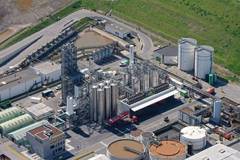Key takeaways
- Ineos Styrolution has received its first delivery of recycled styrene monomer at its Antwerp, Belgium, facility.
- The feedstock, supplied by Indaver’s depolymerization plant, will be used to produce high-quality, food-grade, and medical polystyrene.
- The development supports a circular supply chain and expands Ineos Styrolution’s sustainable styrenics portfolio with advanced recycling solutions.

Ineos Styrolution has announced the first recycled styrene monomer delivery at its factory in Antwerp, Belgium. Indaver supplied the material from its depolymerization plant, also located in Antwerp.
The delivery is set to enable the development of high-quality polystyrene for food-grade and medical applications.
Ineos Styrolution says the recycled feedstock complements its sustainable styrenics portfolio, which contains mechanically recycled and bio-attributed grades.
Rob Buntinx, president of EMEA at Ineos Styrolution, says: “We are pleased that we can now offer styrenics from depolymerization at market scale. This gives our customers more sustainable options to lower their environmental footprint without compromising product quality or performance.”
Indaver’s facility is the first in Europe dedicated explicitly to polystyrene recycling, and the local setup helps create a short supply chain.

According to Ineos Styrolution, depolymerization is more energy efficient than other recycling methods, such as pyrolysis. Depolymerization breaks down polystyrene into its original styrene monomer without changing its basic chemical structure.
Erik Moerman, sales and development director for Plastic to 2 Chemicals (P2C), at Indaver, says: “With P2C, Indaver is pioneering in the circular economy and advanced chemical recycling. By converting hard-to-recycle plastics into virgin-quality feedstock such as styrene, we are closing the loop and offering a sustainable alternative to fossil resources.”
“Our in-house developed technology, combined with strategic partnerships and continuous innovation, enables us to deliver high-purity materials for demanding applications like food packaging.”
Polystyrene advances
Recently, Ineos Styrolution commercialized its Styrolution PS 158K BC100 polystyrene solution, which is made from bio-attributed feedstock and can be used in food packaging. In January, it also launched its first mechanically recycled polystyrene-based yogurt cup.
Some critics point to the negative environmental and health benefits of polystyrene. In March, a study from Pusan National University, South Korea, revealed that polystyrene nanoparticles, commonly used in packaging, can affect red blood cell development in zebrafish embryos — suggesting potential health risks associated with nanoplastics.












